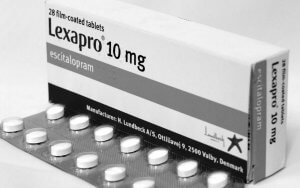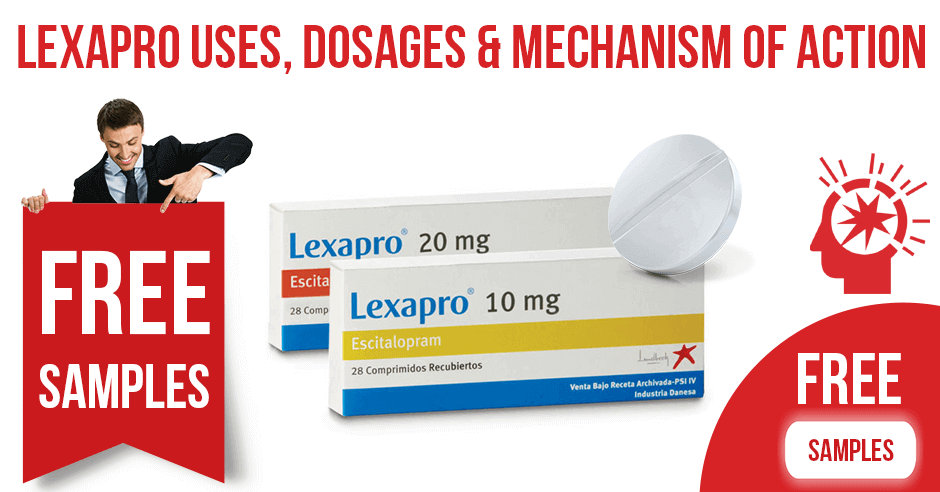Lexapro Uses, Dosages and Mechanism of Action
This article provides all information about Lexapro. Available dosages and types, uses of the medication, effects on the body and benefits of the treatment. Guide to use the drug safely. How does Lexapro work? Keep reading to learn more.
Do you also suffer from this scourge of the 21st century? Major depressive disorder, alongside the other mental disease, generalized anxiety disorder, affect modern society, as life gets more and more hectic.
- What Is Lexapro?
- Lexapro Uses
- Is Lexapro Used for Anxiety and Panic Attacks?
- Does Lexapro Help You Sleep?
- Help for Depression
- Is Lexapro Used to Treat Bipolar Disorder?
- Lexapro for Nerve Pain Relief
- Treats Irritable Bowel Syndrome
- Helps People with Schizophrenia
- Lexapro for Dementia
- Helps to Cope with Anger and Irritability
- Treating Fibromyalgia
- Lexapro and Borderline Personality Disorder
- Reduces Stress
- Can Lexapro Help for Obsessive Compulsive Disorder (OCD)
- Benefits
- Lexapro Dosage
- How Does Lexapro Work?
- How to Take Lexapro Safely?
Do not despair. There are drugs that can help all people with these disorders to live their lives to the fullest.
What Is Lexapro?
Lexapro is the branded name of the drug escitalopram oxalate; it is an antidepressant commonly used for treating various mental diseases. It is available as a generic too. Escitalopram was represented by two pharmaceutical companies, Lundbeck in Denmark and Forest Laboratories in the USA in 1997. Escitalopram was developed from the older drug citalopram that had similar chemical compounds and effects.
Currently, it is manufactured under the wide range of brand names: Aciprex, Articalm, Norestal, Oroes, Serodeps, Servenon and Alvocital in Eastern Europe; Cipralex, Elicea, Escitalopram Actavis and Escitalopram Accord, Zocital, Solatcit and others in Central and Western Europe; Zytomil, Citraz and Aspen Escitalopram in South Africa; Cipra Pro, Psychopram, Nodep, Estikan in Egypt; Etilopram, Firsito, Lifodep Plus, Petril Plus, Pracidep-S and many others produces India; Restaural, E-Zentius, Neopresol, Nexito, S.citap, Aramix in South America.
Escitalopram drugs are also produced in Asia, Australia, some African countries, the Russian Federation, Canada, and New Zealand.
What Type of Drug Is Lexapro?
Lexapro is a mind-altering type of drug. It balances the levels of neurotransmitters and their reuptake in the brain, thus taking a thymoleptic effect on people with major depressive disorder (further MDD) and generalized anxiety disorder (shortened as GAD). This medication represents the family of selective serotonin reuptake inhibitors (further SSRI).
The forms of Lexapro are:
- a round film-coated tablet;
- a liquid escitalopram solution.

Lexapro is a prescribed psychotropic medication that is covered by most insurance plans. It is also available for cash and coupons in some pharmacies and online stores. Without insurance, it can be much cheaper.
FDA Approval
The Lundbeck and Forest Laboratories companies submitted escitalopram to the Food and Drug Administration (further FDA) for approval in March 2001. It took a little more than a year for the administration to run all trials, and in August 2002 the drug was certified for use against depression and, at the end of 2003, for anxiety disorder. The administration came to a conclusion that escitalopram is an effective, safe for long term use medication to treat MDD and GAD. The pharmaceutical company Teva released its own version of an escitalopram medicine, and in 2006 the FDA approved it.
Lexapro Uses
There is a long list of answers for the question “what does Lexapro treat”. Together with the main uses — depression and GAD — Lexapro is used for treating many other mental diseases in adults and adolescents:
- social anxiety disorder;
- obsessive compulsive disorder (further OCD);
- fear of open spaces;
- social phobias;
- the symptoms of premenstrual syndrome, and others.
There is another common reason why do people take Lexapro. Many people discuss the recreational use of these tablets on medical forums on the world wide web. Such use is not licensed. Though many reporters claim that Lexapro helps them to get high, the off-label usage of this medication is highly not recommended.
Is Lexapro Used for Anxiety and Panic Attacks?

Does Lexapro Help You Sleep?
When a doctor diagnoses depression, in most cases it means that a patient has troubles with sleeping. People suffer from the inability to fall asleep or keep sleeping at night. The polar opposite disorder is hypersomnia, when patients have difficulties with staying awake during the daytime. Does Lexapro help you sleep normally? The answer is “yes”! Both disorders can be the consequences of general anxiety, nervousness, stress, and fatigue. Lexapro is prescribed for treating these symptoms, which makes it a good remedy for sleep.
Help for Depression
Escitalopram was approved by medical authorities for major depression treatment. The efficacy of this remedy was proven by several clinical trials. They lasted for 8 weeks and included double-blind placebo control. The patients were divided into three groups: kids and young people from 7 to 17 years old, adolescents from 12 to 17, and adults between the ages of 18-65. All three groups showed a higher effectiveness of Lexapro compared to the placebo. No connection between age, gender, and race to the efficacy of the medicine was indicated during the studies.
Is Lexapro Used to Treat Bipolar Disorder?

Lexapro for Nerve Pain Relief
Another additional indication of Lexapro and generics is neuropathic pain. Peripheral neuropathy (PN) is a nerve disorder that causes, in particular, peripheral nerve damage and pain in the hands and feet. It can be a huge problem, as the pain gets unbearable sometimes, and people with neuropathy cannot live full lives — work, socialize, study, etc. Escitalopram does not cure the reason of the disease, but relieves the neuropathic pain in the body. Doctors often prescribe SSRIs, and escitalopram among others, to allay nerve pain in patients with PN.
Treats Irritable Bowel Syndrome
Irritable bowel syndrome (IBS) occurs for many reasons. The first research that connected this digestive disorder with the brain-gut axis was published in the 1990s. It was noticed, that patients with FMS, anxiety, panic disorder, chronic fatigue, and other unhealthy mental conditions often suffer from IBS. The randomized studies with double masked check and placebo control showed the superiority of escitalopram over placebo in patients with gastrointestinal symptoms.
Different drug forums contain lots of reviews from IBS patients about taking Lexapro and other escitalopram medicines. Many of them write about the almost magical effect of the drug, which helped them to get rid of all symptoms in the short terms after many years of suffering from this disease.
Helps People with Schizophrenia

Lexapro for Dementia
Antidepressants are highly efficacious against anxiety and psychotic behavior. There were studies conducted on their ability to help people with dementia and Alzheimer’s disease. The researchers came to a conclusion that the SSRIs, like escitalopram, give positive results in such patients. It reduces agitation and anxiety, which are related to cognitive impairments. Lexapro and other congener drugs helped patients with signs of depression caused by mental impairments. Selective serotonin reuptake inhibitors improved the emotional intensity and social activity in dementia patients with comparatively mild adverse effects.
Helps to Cope with Anger and Irritability
As said above, the main use of Lexapro is to cure anxiety, agitation, and emotional disorders. The common symptoms of generalized anxiety disorder are anger, aggressiveness, and excessive irritability, which are effectively eliminated with the help of serotonergic antidepressants. People who do not have serious diseases, like MDD or GAD, also report that escitalopram is very effective for problems with mood, socializing, and anger control.
Treating Fibromyalgia

Lexapro and Borderline Personality Disorder
Borderline personality disorder is a continuous unstable emotional state. People with BPD have changeable moods, cannot build relationships with other people, and have low self-confidence and self-esteem. Often, such patients pose a serious danger to their own health and life. The causes of this serious mental disease are not completely known, as it can be from genetics, traumas, physical or sexual abuse, or brain dysfunctions. This illness cannot be cured with drugs, as it needs therapeutic management. But SSRI antidepressants can be prescribed to allay such symptoms of borderline personality disorder as:
- mood changes;
- irritability;
- depression, and others.
These medications help to fight a depressive condition to stay in good spirits.
Reduces Stress
Among many other benefits of Lexapro, there is a great deal of users’ reports about it as the effective anti stress and anti fatigue medication. It is understandable if we remember what type of antidepressant we are talking about. The effectiveness of SSR inhibitors to treat stress, tiredness, and low energy is proven by clinical trials. This quality of escitalopram is also used in cardiology, as it decreases the risk of heart attacks related to stress.
Can Lexapro Help for Obsessive Compulsive Disorder (OCD)

Benefits
There is no need to grope for an answer to the question why do people take escitalopram and prefer it over other meds. Lexapro and drugs of its kind have many advantages. The medical research shows that it has the highest selectiveness among SSRIs. Secondly, it is not a racemic drug. Unlike citalopram, it contains only the S enantiomer and is free from the R one. As a result, Lexapro is more well-directed with more specific functioning in the brain. It works comparatively fast and is well-tolerated by the body, which means it does not cause as many adverse reactions as other preparations.
Restoring the level of serotonin, besides its common indications, it helps to overcome excessive nervousness and fatigue, low mood, and changes in appetite, as well as improves interest in life, activity, concentration, and cognitive functions. Escitalopram allays the feeling of uncontrolled and motiveless worry, guilt, muscle tension, irritability, and suicidal thoughts.
Lexapro Dosage

For major depression and general anxiety in adolescents, Lexapro is prescribed in the dosage of 10 mg daily. The dose can be increased to 15 mg or 20 mg per day, but not earlier than three weeks after starting treatment. The recommended starting dose for adults is the same, but it can be increased after one week. Depending on the received response and effect, some doctors prescribe 25 mg and 30 mg of Lexapro per day.
In 2011, a group of medical scientists conducted research for the purpose of studying the effectiveness of a higher Lexapro dosage, 40 mg, maximum 50 mg per day, in adults with MDD. As a result of the trial, fifty percent of the patients who went through the study to the end showed better results with doses over 20 mg, and they asked to continue receiving higher doses.
There were no clinical trials to compare the effectiveness of Lexapro 5 mg vs 10 mg and 10 mg vs 20 mg. Usually, doctors choose the right dose individually. As for the users, their opinions on forums can be polar opposites. Some of them report that lower doses do not help them, and some evidence about negative side effects of the higher strengths of the medication.
Some users write about their experiences of using the doses 60 mg, 70 mg, 100 mg, and even 200 mg per intake. These amounts are too high and pose a danger. We strictly do not recommend taking the medicament over the standard dose, as it can cause very negative consequences, even coma and rarely death. Always read the medication guide that goes with the drug carefully and follow it strictly.
What Happens if You Miss a Dose of Lexapro?
The discontinuation of taking escitalopram should not be abrupt. One of the most common requests on medical sites and forums is: “what happens if you miss a dose of Lexapro”. Even one missed dose can cause such signs of withdrawal as headache, dizziness, tiredness, increased symptoms of the treated diseases, mood changes, confusion, and cognitive impairments.
If you miss a dose of the medicine for any reason, you should take it right away when you remember, with only one exception — if the next time to take the drug is close. Never take a double dose to compensate for the missed one.
How Does Lexapro Work?

There is no common indication about how long does it take for Lexapro to work. It can take 8 weeks for the drug to kick in and start fighting depression to improve interest in life. The drug needs much less time to work for normalizing sleep, appetite, and activity — a week or two. Escitalopram improves most symptoms of mental and emotional disorders, and the time of action depends on the diagnoses, the severity of disease, and the personal condition of each and every patient.
How to Take Lexapro Safely?
First of all, Lexapro should be taken exactly as the doctor prescribed. Read the medication instructions carefully, avoid upping or lowering the dosages without professional advice. If you take the liquid form — never measure it by eye, instead of asking your pharmacist for a measuring device. Use the medicine exactly as long as you have been instructed. It is better to take it in the same time of a day, once a day. Usually, it is better to do in the morning, but let your doctor indicate the best time for the medicine, as it can be important, too. Lexapro can be taken with or without food.
Control mood changes and report them to your doctor. If you have symptoms of the serotonin syndrome, immediately inform your medical adviser.
The signs are:
- hallucinations;
- high temperature;
- sweating and shivering;
- abnormal heartbeat;
- diarrhea, vomiting;
- seizures, coordination problems.
These symptoms can increase to a life-threatening degree.
You may run into such negative effects of using Lexapro, as:
- stomach pain, headache, chest pain;
- fatigue, slumberous feeling, inactivity, loss of sexual interest;
- excitement, high temper;
- symptoms of common cold;
- appetite changes.
These reactions to the drug may pass with time, but if you feel some serious changes and severe conditions, like suicidal thoughts, insomnia, uncontrolled aggression and anger, mania, depression, or panic attacks, seek immediate medical advice. Do not take the medication until you are sure that you have no allergy to escitalopram and citalopram.
It may occur that you feel your medications are not working anymore. It is not just your imagination, as it can really happen. There are many reasons for it, including acquired tolerance and brain or hormonal changes, etc. How do you fix it? The two common ways to make your antidepressant work again are to increase the dose or to quit taking it and let your body restore to the default level of serotonin. There is no need to change the antidepressant, as they all are serotonergic by the mechanism of action. Do not make a decision yourself, but make sure to ask your doctor for professional assistance.
There are certain and strict precautions about using this drug. Lexapro should not be used with other antidepressants, including monoamine oxidase inhibitors. You should take two weeks’ break between taking these two medicaments. Avoid taking nonsteroidal anti-inflammatory medications, opioids, blood thinners, stimulants like amphetamines and dopamine reuptake inhibitors, lithium, St. John’s wort, tramadol, and some other medicines that treat cognitive and emotional diseases contemporarily with SSRIs. Avoid taking Lexapro together with antiretroviral therapy, antibiotics, and antifungals. Do not take it with alcohol.

- kidney or liver dysfunction;
- clotting defect;
- stroke;
- manic depression;
- heart failure, hypertension;
- and seizures, you should inform your doctor before using Lexapro.
In general, provide your medical adviser with the max information about the medicines you take and illnesses you have or have had before.
There are no precautions against using Lexapro during pregnancy, but only use it if the benefits are greater than possible adverse effects. As for the postpartum and breastfeeding period, there is no evidence that escitalopram below 20 mg in a day can influence the quality of milk or the health of infants.
In the case of overdose on escitalopram, you may feel nausea, vomiting, excessive drowsiness, lack of oxygen and cyanosis, amnesia, confusion, and muscle breakdown. People often ask “can you die taking Lexapro and what is the lethal dose”. It is completely individual. There were cases of overdose with 1000 mg without fatal consequences. At the same time, lesser amounts of drugs have caused death in patients who did not get medical help in time.
How to Stop Taking Lexapro Pills?

Then it is recommended to split 5 mg in half, and take 2.5 mg of the medication every other day for some time. Only then you should stop taking the pills. There is no answer for all for the questions about how quickly you can lower the dose. Follow your doctor’s advice. This is the best way to stop taking Lexapro with the minimum risk of withdrawal.

 Order Free Artvigil 150 mg Armodafinil 10 Samples Online
Order Free Artvigil 150 mg Armodafinil 10 Samples Online Generic Modalert 200mg Modafinil 10 Samples Pack
Generic Modalert 200mg Modafinil 10 Samples Pack

